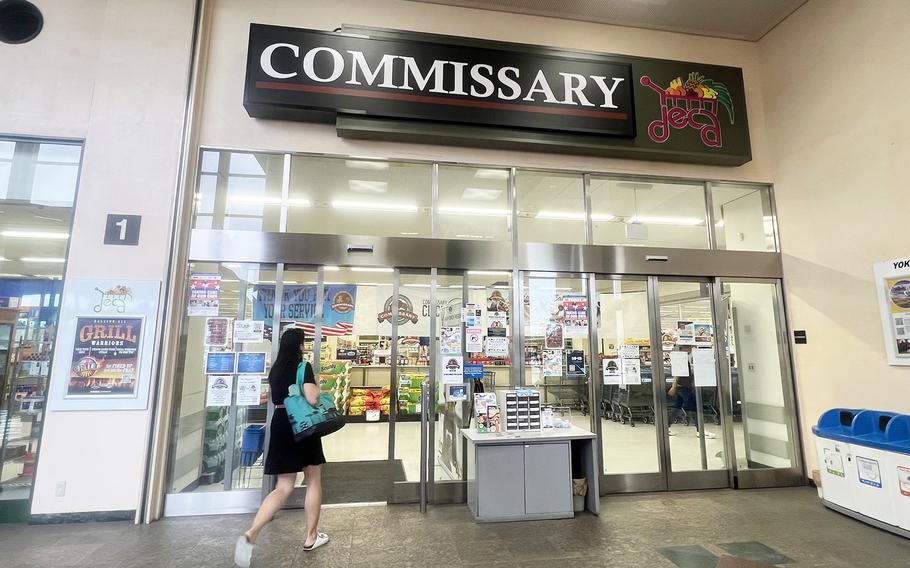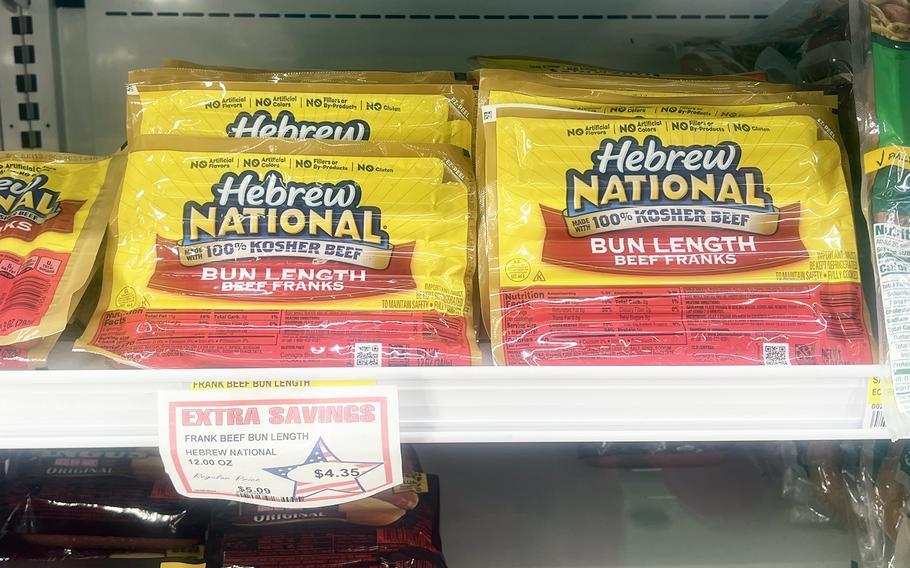
A shopper enters the commissary at Yokota Air Base, the home of U.S. Forces Japan in western Tokyo, June 6, 2024. (Kelly Agee/Stars and Stripes)
The Defense Commissary Agency is working on improving its selection of kosher and halal foods to accommodate members of the Jewish and Islamic faiths, according to a DeCA spokeswoman.
Tens of thousands of military beneficiaries practice a religion that carries unique dietary requirements, but commissaries have limited supply, integration and promotion of certified kosher and halal options, according to a May 29 letter to the agency from two congresswomen.
“We request DeCA urgently address issues regarding access to foods that meet religious dietary restrictions,” U.S. Reps. Ayanna Pressley, D-Mass., and Chrissy Houlahan, D-Pa., wrote to commissary director John Hall.
“This neglect undermines the diversity and appreciation of the military community and discourages specific religious groups from serving,” the lawmakers wrote. “No active-duty personnel should have to sacrifice their faith to serve in our military.”
DeCA already stocks more than 16,000 kosher products and nearly 400 halal products, DeCA Headquarters and Support Center spokeswoman Tressa Smith told Stars and Stripes by email Wednesday.
After reviewing its kosher and halal offerings, DeCA solicited additional halal options from the food industry, Smith said.
“From giving notice to getting newly selected products onto the shelf, the process takes several months,” she said. “DeCA is looking for an opportunity to create a Ramadan promotional package, in addition to its Passover package.”
DeCA recently added Pre Brands beef, which is certified halal, to all stateside commissaries after testing it in smaller markets, Smith said.
“The Defense Commissary Agency has a mission to deliver a benefit that improves the quality of life and readiness of its military patrons,” she said. “Providing an assortment that speaks to its patrons’ preferences and needs – including religious dietary options – is a vital component of DeCA’s effort to be its patrons’ grocery provider of choice.”

The Defense Commissary Agency stocks more than 16,000 kosher and nearly 400 halal products, according to DeCA Headquarters and Support Center spokeswoman Tressa Smith. (Kelly Agee/Stars and Stripes)
Approximately 10,000 Jews serve on active duty in the United States military, Lauren Magy, a spokeswoman for the Jewish Community Centers of North America, told Stars and Stripes via email Wednesday.
Approximately 5,000 Muslims are serving, according to Department of Defense data from 2023.
“The Jewish and the Muslim population are kind of struggling to source food, especially here in Japan,” Air Force spouse Alaa Rodgriguez told Stars and Stripes on Tuesday at Yokota Air Base in western Tokyo.
Rodgriguez, a Muslim from Manama, Bahrain, follows the halal diet. She bought meats from Tokyo Camii and Diyanet Turkish Culture Center in Shibuya, more than an hour by train from Yokota, until she found Haijima Halal Food, a five-minute drive from the base.
“For people that are here on a longer term, they have other options and know where to get the food that they’re comfortable eating,” she said. “But for people that are here for a short period of time and want a quick solution, they don’t find it at the commissary, and it makes their life challenging.”
At Yokota alone there are 10 Jewish and 16 Muslim service members, Chaplain (Lt. Col.) Joseph Friedman said by phone Tuesday.
Friedman, a rabbi, said many military Jews are nonobservant, partly because fresh kosher items usually appear on commissary shelves around Passover in spring and tend to run out during the year.
“Kosher food is something that we can’t wait on once a year for,” said Friedman, who holds a Sabbath dinner at Yokota every Saturday.
Kosher markets in Tokyo are hard to come by in Tokyo, he added.
“There are little things could be added by DeCA that would make a difference to Jewish Service members,” Friedman said. For instance, the commissary could stock the kosher variety of many ordinary items, such as macaroni and cheese, that are acceptable to people of any faith.